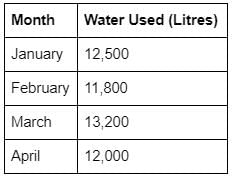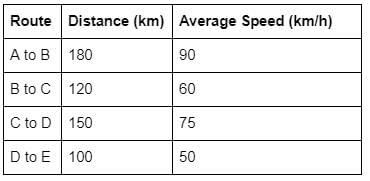UCAT Exam > UCAT Tests > Test: Basic Arithmetic and Estimations - 2 - UCAT MCQ
Test: Basic Arithmetic and Estimations - 2 - UCAT MCQ
Test Description
10 Questions MCQ Test - Test: Basic Arithmetic and Estimations - 2
Test: Basic Arithmetic and Estimations - 2 for UCAT 2025 is part of UCAT preparation. The Test: Basic Arithmetic and Estimations - 2 questions and answers have been prepared
according to the UCAT exam syllabus.The Test: Basic Arithmetic and Estimations - 2 MCQs are made for UCAT 2025 Exam.
Find important definitions, questions, notes, meanings, examples, exercises, MCQs and online tests for Test: Basic Arithmetic and Estimations - 2 below.
Solutions of Test: Basic Arithmetic and Estimations - 2 questions in English are available as part of our course for UCAT & Test: Basic Arithmetic and Estimations - 2 solutions in
Hindi for UCAT course.
Download more important topics, notes, lectures and mock test series for UCAT Exam by signing up for free. Attempt Test: Basic Arithmetic and Estimations - 2 | 10 questions in 7 minutes | Mock test for UCAT preparation | Free important questions MCQ to study for UCAT Exam | Download free PDF with solutions
Detailed Solution for Test: Basic Arithmetic and Estimations - 2 - Question 1
Test: Basic Arithmetic and Estimations - 2 - Question 2
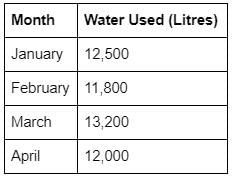
Estimate average water usage per month.

Detailed Solution for Test: Basic Arithmetic and Estimations - 2 - Question 2
Test: Basic Arithmetic and Estimations - 2 - Question 3
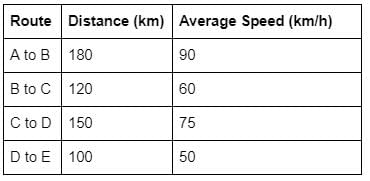
How long does it take to travel from A to B?

Detailed Solution for Test: Basic Arithmetic and Estimations - 2 - Question 3
Detailed Solution for Test: Basic Arithmetic and Estimations - 2 - Question 4
Test: Basic Arithmetic and Estimations - 2 - Question 5
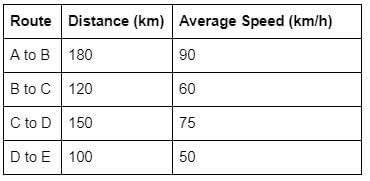
What is the total distance travelled across all journeys?
Detailed Solution for Test: Basic Arithmetic and Estimations - 2 - Question 5
Test: Basic Arithmetic and Estimations - 2 - Question 6
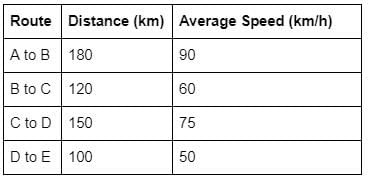
Estimate the average journey time across all routes.
Detailed Solution for Test: Basic Arithmetic and Estimations - 2 - Question 6
Test: Basic Arithmetic and Estimations - 2 - Question 7
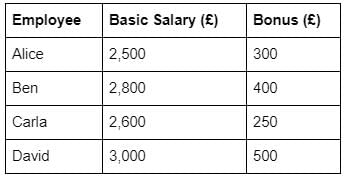
What is Alice’s total salary for the month?
Detailed Solution for Test: Basic Arithmetic and Estimations - 2 - Question 7
Test: Basic Arithmetic and Estimations - 2 - Question 8
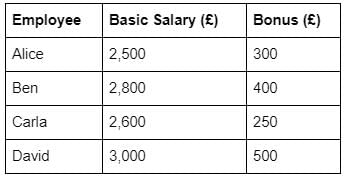
Which employee earns the highest total amount?
Detailed Solution for Test: Basic Arithmetic and Estimations - 2 - Question 8
Test: Basic Arithmetic and Estimations - 2 - Question 9
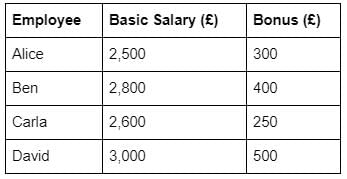
Estimate the average basic salary of all four employees.
Detailed Solution for Test: Basic Arithmetic and Estimations - 2 - Question 9
Test: Basic Arithmetic and Estimations - 2 - Question 10
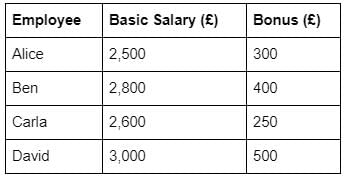
If bonuses increased by 10%, what would be Carla’s new bonus?
Detailed Solution for Test: Basic Arithmetic and Estimations - 2 - Question 10
Information about Test: Basic Arithmetic and Estimations - 2 Page
In this test you can find the Exam questions for Test: Basic Arithmetic and Estimations - 2 solved & explained in the simplest way possible.
Besides giving Questions and answers for Test: Basic Arithmetic and Estimations - 2, EduRev gives you an ample number of Online tests for practice
Download as PDF


